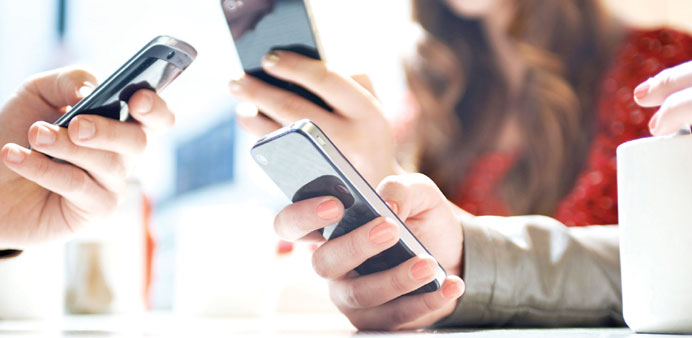Two thoughtful letter-writers tell Omar L Gallaga how we’re missing the heartbeats for the flat bleeps
Recently, the new models of Apple’s iPhone — the iPhone 6S and the larger 6S Plus — landed in the hands of shoppers who upgraded or in some cases switched to a smartphone for the first time.
It’s the ninth time Apple has had a launch day for iPhones. By now the process is more than familiar. The preorder period, the instant-gratification seekers who stand in line the morning of, the breathless reviews, which typically include very minor criticisms. It’s all very routine.
But I sometimes forget that for a lot of people, it’s not an iPhone world. For some, the world’s best-selling smartphone is not a constant companion, but, as if in some Twilight Zone episode, a gadget that has made the world around them a lot more distracted and a little less friendly.
In June, I wrote about the time I drowned my iPhone 6 in Hawaiian seawater, then experienced improbable bliss — and itchy withdrawal — as I wandered around phoneless for about a week. The column resonated with some readers, in particular two who wrote in similar responses that I held on to and thought about all summer.
Carol Hitchcock, in a handwritten letter, wrote, “Dear Mr. Gallaga, your column struck a note with me. You are on point with people being addicted to their iPhones.
“We were recently in Jamaica at a beautiful beach resort and people could not put their phones down to enjoy the wonderful scenery and, like you said, a gorgeous sunset or even converse with their travelling companions.
“We are in our 70s, so I know we don’t understand all this new technology. We don’t own an iPhone and I realise it has many useful applications, but I think it’s sad that people are so addicted that they cannot enjoy surroundings or the people they are with.
“We love our paper in the morning, reading it, and having a cup of coffee. I don’t want to sit @ a computer to do that. The paper is getting thinner and thinner so I hope we at least have a few years to read the paper in actual print. Carol.”
I hope so, too.
Another reader, Sterling Hartman, e-mailed to say, “I’m 71 and purchased my first cell phone yesterday — Apple iPhone 6 arriving tomorrow. I have used the $10 TracFone when we travel but figure that doesn’t count as a cellphone.
“I’ve often wondered why cell phones are so addictive and have avoided them because I see young folks in their 20s, who should be interested in each other, praying to their cellphones. I see them checking their cells in church during the service. I see them at Hawaii airports turning them on at the earliest instant and waiting until the flight attendant comes by to tell them it is time to turn it off because we’re landing in 30 seconds.
“They seem to think reality is in their cell phone screen and don’t realise the real reality is out there waiting to embrace them if they would but look up.
“I wouldn’t be surprised at all if the cellphone addicts on their honeymoon both take their phones to bed with them.
“I was in a student cafeteria and in walks a blind woman with her white cane with a stripe. She headed the wrong way and got herself boxed in a corner. I got up and helped her over to the cafeteria line. Not a single student came over to help because they were all so engrossed in the cellphones; no-one notices except one old geezer who didn’t have a cellphone, me.
“I’m leaving my iPhone 6 at home when we go to Kauai in December and taking my $10 TracFone.”
Since the column ran, I wish I could say I’ve been using the phone that replaced my dead one a lot less. The truth is, it’s still a vital part of my day for keeping up with news, corresponding with co-workers, friends and family, and for communicating with the world through social media, photos and video.
But what the experience of being without a phone for a week has left me with is more awareness of when I should and shouldn’t take the phone out of my pocket and a better radar for what people around me are doing.
On a recent evening, I went to an outdoor party and was stunned to see that, in a crowd of several hundred people, almost no-one was nose-deep in their smartphone. The only phones out were being used to shoot photos. There was no texting that I could see — and it was blissful. I thought perhaps, I had traveled in time.
I think some of it may be generational; if I were in my 70s, I imagine I’d feel even more strongly about what cellphones are doing to us, as Hitchcock and Hartman do. But I do think some things — a great face-to-face conversation with a kindred soul, a refreshing beach swim, the stillness of mind that comes from an adventure where you’re completely cut off from anyone else — are universal. You don’t have to be that age to want back more of your life and attention from the smartphones we’ve adopted as our all-day companions.
It’s up to each of us to reach out to someone we care about and remind them that the real world is a lot better — more fun and engaging — than what fits in a 4.7- or 5.5-inch smartphone screen. And then to convince ourselves, as often as we can, especially during those in-between, bored moments when that little glass rectangle seems to hold all the world inside. —Austin-American Statesman/TNS

